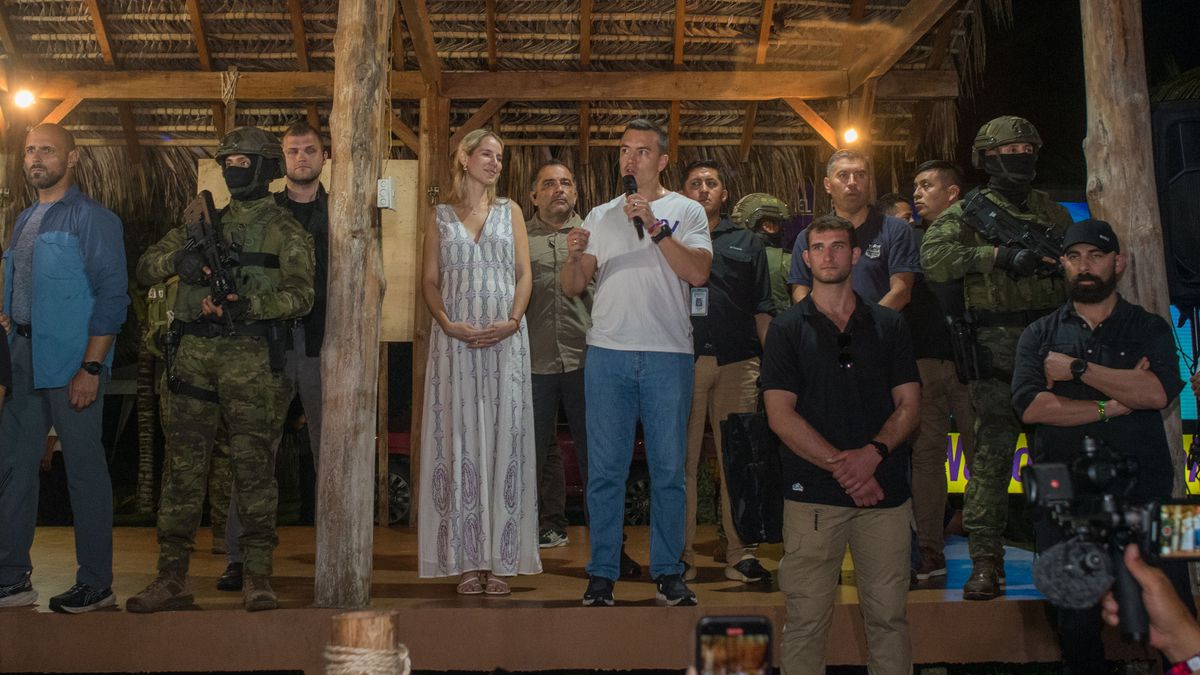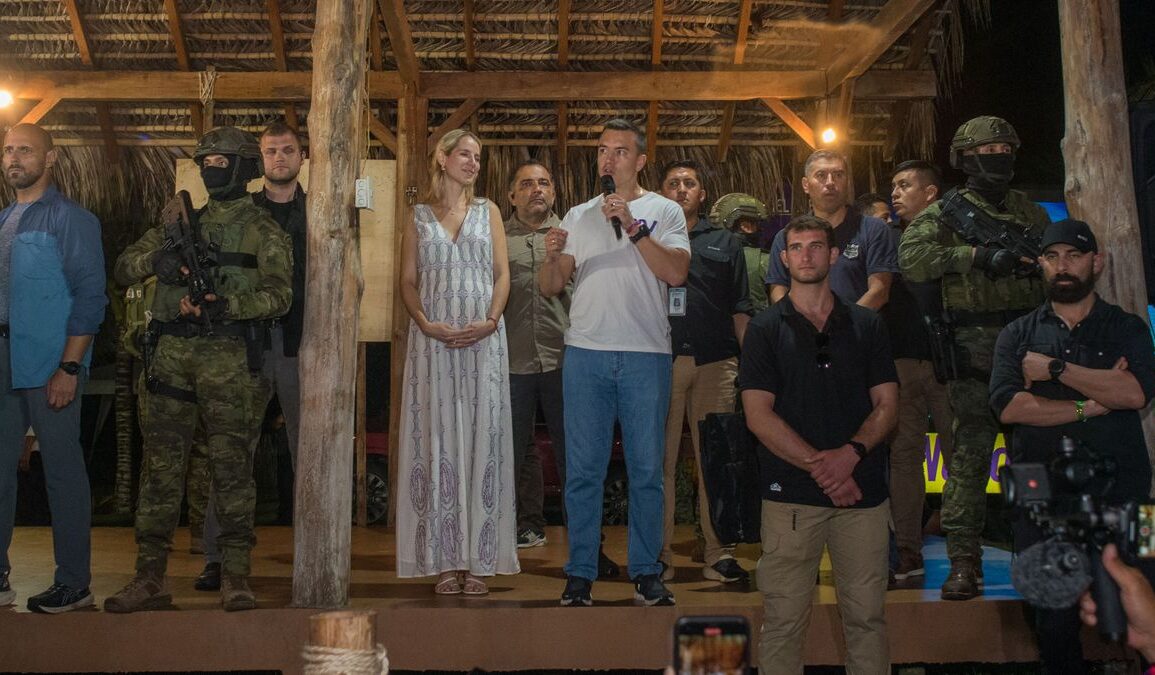
Daniel Noboa, a 35-year-old businessman, will be the next president of Ecuador. He is the son of the richest man in the country, but little is known about him. He has no political experience, and practically all the economic decisions he will face affect, in one way or another, his family fortune, built on a banana export business spanning three generations. With more than 90% of the ballots counted and 52.3% of the vote, he easily beats his opponent Luisa González, who was chosen by former president Rafael Correa.
Noboa does not come from any political party nor does he define himself ideologically, but his liberal discourse and intention to reduce taxes and encourage foreign investment place him in the center-right. During the presidential campaign, he has shown himself to be a family man — he is married with two children and a third on the way — who runs five miles a day and lifts weights. Ahead of Sunday’s vote, he posed with boxing gloves in front of a punching bag and bragged about his friendship with a UFC fighter. He has tried to sell himself as a successful businessman who owns his own helicopter.
Noboa’s victory is a slap in the face for Correismo, the political movement around Rafael Correa and his Citizen Revolution Movement. The former president chose Luisa González, an unknown politician without much charisma, as the presidential candidate for his party. But her promise of returning to the past, when the country grew with oil money and lifted millions of people out of poverty, was not enough to win the election. González never connected with voters, nor was she able to distance herself from her mentor, Correa, who is disliked by a significant part of the population. The result was, in some ways, a surprise. In February, in the provincial and municipal elections, the Citizen Revolution Movement won in Quito, Guayaquil and 48 other cities, and installed prefects in nine of the country’s 24 provinces. The result was viewed as a great success for the party and seemed to put Correismo on the path to the presidency. But it didn’t work out that way.
Serene, without any noticeable euphoria, Noboa offered his first words after learning of his triumph: “Tomorrow we will begin to work for a new Ecuador, to rebuild a country that has been seriously hit by corruption, violence and hatred.” The candidate followed the vote count from his beach house, three hours from Guayaquil, with his family and his campaign team. A quarter of an hour earlier, González acknowledged defeat at the headquarters of her party, in Quito, and extended a hand to the winner: “Enough of hatred, of polarization. Ecuador needs to heal. They are counting on us for a common agreement for our country.”
Noboa, the youngest president in Ecuador’s history, will take office in December. He will only govern for 16 months, the remainder of Guillermo Lasso’s presidential term, who dissolved the National Assembly in May and called elections to avoid an impeachment trial for corruption. Noboa will lead a country that is economically stagnant, where prison riots, the appearance of dismembered corpses and hitmen murders have become common. As of September, 3,600 homicides had been committed in the country, double last year’s figure. Drug cartels have infiltrated a nation that until a few years ago had been untouched by the region’s problems of drug trafficking and guerrilla warfare. The dollarization of the Ecuadorian economy and its extensive coastline on the Pacific have made it an attractive territory for organized crime.
By winning the election, Daniel has fulfilled a family dream. His father, a man with a fortune of $910 million, according to Forbes, ran for president up to five times. He was a populist politician who presented himself as the Messiah of the poor, giving away computers, bags of food and handing out cash at his rallies. Correismo was his political enemy. His son, however, has not entered into direct disputes, wanting instead to project the image of someone far from politics. Noboa put a screen between himself and his rivals. He was also unaffected by the fact that his family’s business, banana exporter Noboa, has $90 million in overdue taxes, and the last-minute revelation that he has businesses in tax havens.
But Noboa’s modern image contrasts with the ideology of his running mate, Verónica Abad. She defines herself as a right-wing, conservative and pro-life. On social issues, it is unclear where the businessman stands.
Two moments in particular led Noboa to victory. In a presidential debate, along with six other candidates, he was calm, firm, and at no time did he enter into an argument with any opponent. He conveyed the feeling that he was far removed from party politics. It was his letter of introduction to the country, and it worked. The other decisive moment was the murder of presidential candidate Fernando Villavicencio, a journalist accustomed to denouncing corruption. His death rocked Ecuador. After the murder, the polls flipped and Noboa went from trailing to leading.
The future president has not been very specific when presenting his proposals on security. He has talked about using satellites and drones, militarizing prisons, ports and customs, and building prisons on barges in the middle of the sea to lock up the most dangerous criminals. The power of the cartels, paradoxically, has grown from the prisons, where anarchy reigns. Behind their walls, they have put the state in check. Specialists hope that Noboa will soon make an important announcement regarding security that will reaffirm him as a firm leader against organized crime.
Ecuador’s economy is going through a critical moment. Noboa’s mandate is too short to propose a much-needed tax reform. The government will face a fiscal deficit of $5 billion at the end of this year, during which time the economy will only grow 0.8%. Although it is prohibited by law, both the new president and his opponent raised the possibility of using the Central Bank as a lender during the campaign. Noboa will not be able to use the International Monetary Fund (IMF), which lent Lasso $6.5 billion between 2020 and 2022. Experts propose raising VAT and reducing fuel subsidies, which cost the country $3.5 billion — almost the same amount that goes to health and education.
In short, Noboa has successfully unified the forces that oppose Correa. When he saw himself leading in the polls after the first round, he sat back and waited. He shared campaign videos without political bite on social media, and he has not given interviews to the press. Mobilizing the anti-Correismo vote was enough to win the election. Finally, the doors of the Carondelet Palace, the presidential residence, have opened for a Noboa.
Sign up for our weekly newsletter to get more English-language news coverage from EL PAÍS USA Edition
This post was originally published on this site be sure to check out more of their content.







